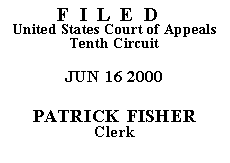 UNITED STATES COURT OF APPEALS
UNITED STATES COURT OF APPEALS
 UNITED STATES COURT OF APPEALS
UNITED STATES COURT OF APPEALS
TENTH CIRCUIT
| BOBBY EARL JONES, | |
| v. | No. 00-5008 |
| STEVE HARGETT, | (D.C. No. 97-CV-1011-K) |
ORDER AND JUDGMENT(*)
Before BALDOCK, HENRY, and LUCERO, Circuit Judges.(**)
Petitioner Bobby Earl Jones, proceeding pro se, filed a petition for a writ of habeas corpus under 28 U.S.C. § 2254. The district court denied the petition and denied Petitioner's application for a certificate of appealability, concluding that Petitioner failed to make a substantial showing of the denial of a constitutional right, see 28 U.S.C. § 2253(c)(2). We deny Petitioner's application for a certificate of appealability as well and dismiss his appeal.
In 1995, a jury convicted Petitioner of robbery by force, after former convictions of two or more felonies, in the District Court of Tulsa County, Oklahoma. The trial court sentenced him to 35 years imprisonment. On direct appeal, the Oklahoma Court of Criminal Appeals (OCCA) summarily affirmed Petitioner's conviction and sentence. Jones v. State, No. F-95-532 (Okla. Crim. App. Apr. 19, 1996) (unpublished). Petitioner subsequently filed a petition for state post-conviction relief in state district court. The state court denied relief and the OCCA affirmed. Jones v. State, No. PC 97-1250 (Okla. Crim. App. Oct. 8, 1997) (unpublished).
Petitioner filed a § 2254 petition in federal district court raising the following nine claims: (1) the trial court lacked subject matter jurisdiction; (2) ineffective assistance of counsel during preliminary proceedings; (3) ineffective assistance of trial counsel; (4) prosecutorial misconduct; (5) no probable cause to bind over at preliminary hearing for trial; (6) the trial court erred by not granting a mistrial when the prosecutor used prejudicial evidence of other crimes; (7) ineffective assistance of counsel at the preliminary hearing; (8) ineffective assistance of appellate counsel; and (9) admission of an in-court identification of Petitioner, which was tainted by a suggestive pretrial identification procedure, violated Petitioner's due process rights.
The district court denied claims (6) and (9) because Petitioner raised those claims on direct appeal and the state court's adjudication did not result "in a decision that was clearly contrary to, or involved an unreasonable application of, clearly established Federal law, as determined by the Supreme Court of the United States." 28 U.S.C. § 2254(d)(1); see Williams v. Taylor, 120 S. Ct. 1495, 1516 (2000). Similarly, the district court denied claims (1) and (8), which Petitioner raised in his state post-conviction proceeding.
The district court denied the claims (2)(5) and (7), which Petitioner could have but failed to raise on direct appeal, as procedurally barred on an independent and adequate state ground. See English v. Cody, 146 F.3d 1257, 1259 (10th Cir. 1998). The record shows different counsel represented Petitioner at the preliminary hearings, at trial, and on appeal. Further, the claims may fairly be resolved on the record without additional fact finding. See id. at 1264. The district court concluded Petitioner failed to establish cause and prejudice or a fundamental miscarriage of justice to overcome the procedural bar. See Coleman v. Thompson, 501 U.S. 722, 750 (1991).
A petitioner may appeal the denial of a § 2254 petition only "if a circuit justice or judge" issues a certificate of appealability. 28 U.S.C. § 2253(c)(1)(A). A certificate of appealability "may issue . . . only if the applicant has made a substantial showing of the denial of a constitutional right." Id. at § 2253(c)(2).
We have thoroughly reviewed Petitioner's application for a certificate of appealability, his brief, and the district court's order, and the entire record before us. We conclude that Petitioner has failed to make a showing of the denial of a constitutional right substantially for the reasons set forth in the district court's order. Accordingly, we deny his request for a certificate of appealability and dismiss the appeal.
MOTION DENIED; APPEAL DISMISSED.
Entered for the Court,
Bobby R. Baldock
Circuit Judge
*. This order and judgment is not binding precedent, except under the doctrines of law of the case, res judicata, and collateral estoppel. The court generally disfavors the citation of orders and judgments; nevertheless, an order and judgment may be cited under the terms and conditions of 10th Cir. R. 36.3.
**. After examining the briefs and appellate record, this panel has determined unanimously that oral argument would not materially assist in the determination of this appeal. See Fed. R. App. P. 34(a)(2); 10th Cir. R. 34.1(G). The case is therefore ordered submitted without oral argument.